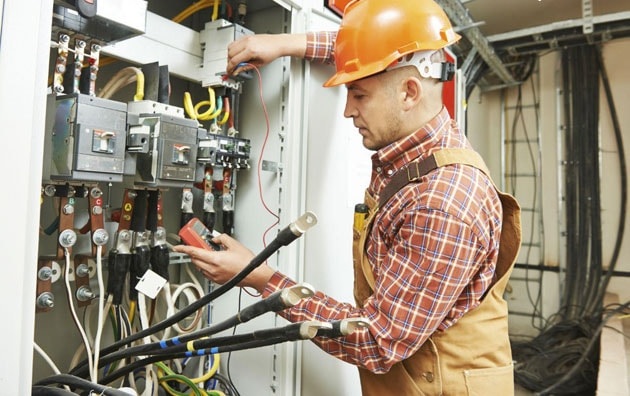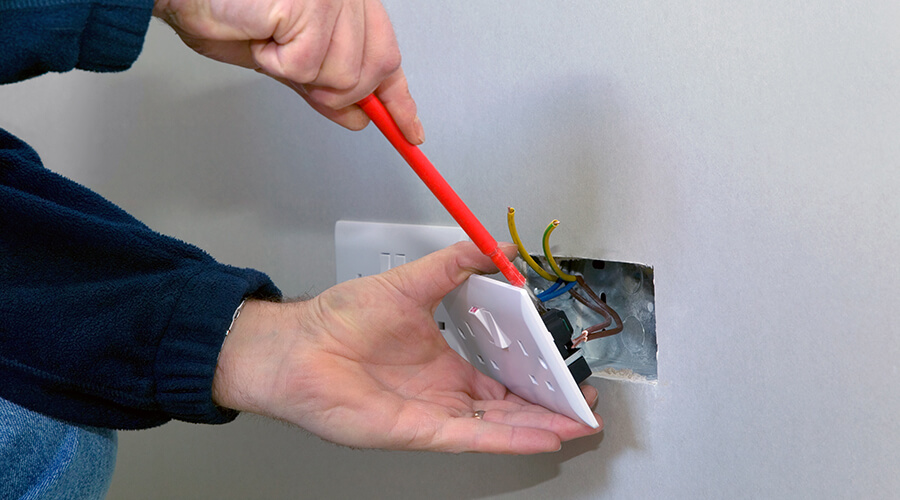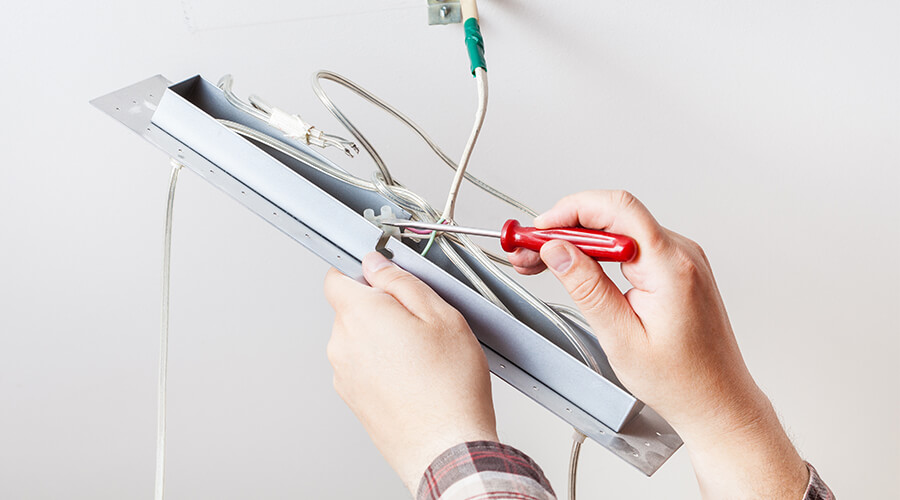Steps for Proper Electrical Maintenance
Remember the golden rule: Safety first
You should never start any home maintenance or repair work without proper preparation and safety tools. When working with electrical items, make sure to unplug the unit or turn off the power to the specific circuit. Don’t forget that water and electricity don’t get along, so make sure to unplug anything electric before cleaning. Never use a metal ladder when performing electrical tasks.
Use electronics accordingly
It’s important to be smart about how you’re using electronics. Avoid plugging in too many things into one circuit, which can overload it and cause a power outage. Be mindful of where you place small appliances and electronics, such as toaster ovens and hair dryers. Make sure they’re not under any vents that could potentially drip on them or are too close to a source of water, such as sinks and showers. Further, the Occupational Safety and Health Administration recommends installing ground-fault circuit interrupters for all of the outlets in wet locations, such as kitchens, bathrooms and laundry rooms. They’re designed to turn off electric power immediately in the event of an incident, which can be a potentially life-saving feature.
Be mindful of plugs, outlets and wires
Treat your plugs kindly and don’t force them to fit into outlets. Don’t try to bend and adjust the prongs, as this could cause an electric shock. Alternatively, if it’s loose inside the outlet, it may be time to replace the cord for a fresh plug. Replace old outlets with new electric sockets with advanced safety features, such as built-in surge protectors. Unplug extension cords when you’re not using them to avoid an electric and fire hazard. When you’re outside, only use cords and electrical items that are specifically for the outdoors.
Schedule routine professional check ups
Electricity can be dangerous, so never hesitate to call a licensed electrician for help. In fact, one of the most important steps in good electrical maintenance is having a professional inspect your system at least once a year. An electrician can check your electric panel, replace damaged wires and test circuit breakers.

Electrical Safety & Maintenance Tips
- Consistently tripped breakers (or blown fuses) are an indication of electrical system problems.
- Flickering or dimming lights are warning signs of an overloaded circuit.
- A burning odor or a mild shock coming from an outlet are also signs of an overloaded circuit.
- Make sure that all the breakers or fuses in your breaker box are clearly labeled.
- Never plug two or more extension cords together.
- Always check an extension cord for damage before plugging it into an outlet.
- Only plug one major appliance (refrigerators, washing machines, dishwashers) into a receptacle outlet at a time.
- All major appliances should be plugged directly into a receptacle outlet.
- An overreliance of extension cords indicates that there are not enough outlets in your home.
- Never use a three prong plug in an outlet with only two slots.
- Never attempt to use an extension cord as permanent wiring.
- Never use an electrical cord outside that isn’t specifically designated for outdoor use. Indoor cords are not designed to withstand the elements.
- Extension cords should never be placed underneath rugs or in the path of a heavily trafficked area.
- If you have toddlers or young children, make sure that you replace all your easily accessed outlets with tamper resistant receptacles.
- Only use the appropriate wattage bulb for a lighting fixture. An incorrect wattage might start a fire.
- Ground Fault Circuit Interrupters (GFCIs) are required by the National Electrical Code in every room/area where there is a water fixture. Homes built before 1970 might not have GFCIs installed in outlets.
- Check your home’s outlets for GFCI protection. If the outlets do not contain a red rest button, they have not been replaced with GFCIs.
- Arc-Fault Interrupters (AFIs) protect against dangerous arc-faults. AFCI Breakers should be installed in your home to combat arc-faults caused by damaged, overheated or stressed wiring.
- AFCIs should only be installed by licensed electricians.
- If your home is over 40 years old or has recently had a major addition, renovation or large appliance added it should be inspected by a licensed electrician.

Tips To Maintain Your Electrical Wiring
- The presence of live current in switch boards and sockets, however mild they might be, can be a sign that your wiring has been exposed to water or is not getting earthed right. If a switch in the washroom or kitchen gives you even a tiny shock when you turn it on and off, chances are that there is an issue.
- Notice frequent dips in voltage, flickering lights once in awhile or bulbs fusing more often than they should? Definitely a sign of internal electrical wiring damage.
- Appliances can get damaged by short-circuiting, but there are times when the only sign of the fluctuation or short circuit is through the appliance malfunctioning itself. If your plug sparks when it is in the socket or an adapter heats up and doesn’t work even though the voltage is appropriate, then there could be a problem with the electrical outlet.
- Each circuit board has a specific limit to the load it can take, but within that limit, the appliances connected to it should function perfectly. If the turning on of the dishwasher or air conditioner causes lights to dip, the circuit may be damaged and unable to take the load.
- Besides visible signs, make sure that you keep an eye out for open wiring being chewed by rats or raccoons in the attic, or rainwater accumulating around the circuits in the basement. Even though the impact may not be immediate, any noticeable damage to the wires can lead to serious internal havoc.
The far-reaching effects of faulty wiring bring to mind the much used saying ‘better safe than sorry’. A small investment in a professional, DIY check-up of your electrical wiring or getting the home warranty for your home can be imperative to keeping you and your loved ones safe. Repairs are costly and maintenance is no doubt an easier way to prevent future problems, so we bring to you seven simple tips to keep track off and maintain your entire electrical wiring system.
Routine Testing
Mark your calendars and keep a monthly check on your electrical outlets, you can do this by yourself and won’t need any assistance. The testers are inexpensive – you can find them at any home hardware store. A three-prong plug, the tester will have indicator lights on each prong. As you plug the tester into each outlet, the lights indicate any problems with the individual outlet. The earlier you know the problem the easier it is to get it solved and the risk of fire or a greater electrical malfunction is avoided.
Electrical Safety Checklist for Your Home
- If you have breakers tripping and fuses blowing on a regular basis,it’s time to bring in a professional to inspect your home.
- Be sure all your circuits are properly grounded. A circuit consists of wires transporting electrical current to your lights and appliances, so properly grounded wiring is connected to a ground wire in your home.
- All outlets near wet locations such as kitchens, bathrooms, or laundry rooms should be Ground-Fault Circuit Interrupters (GFCI).
- Water and electricity don’t mix, so unplug any appliance before you wash or wipe it down.
- If you have children or grandchildren, put protectors in all your outlets or replace them with tamper-resistant outlets, as these outlets are now required by code in all new homes.
- Replace any frayed wires in your house, as they can potentially cause shocks or fires.
- Replace all plugs that wobble or fit loosely in the socket.
- Never force a plug into a socket, and never attempt to adjust a plugs metal prongs to make it fit. Both actions are dangerous!
- Make sure all plugs and cords are kept a safe distance from heat sources such as radiators or space heaters. Don’t place furniture on top of cords, and don’t run cords under rugs or blankets.
- Any indication of dimming lights, flickering lights, a sizzling sound, or a burning odor mandate a prompt professional investigation.
- Never plug a generator directly into your home’s electrical system, as this can unintentionally damage appliances or even put you at risk. Hire an electrician to get it done safety.
- When outside, only use cords (and items) labeled for outdoor use.
- Extension cords are a temporary solution. They shouldn’t be used to power home appliances on a permanent basis. Most extension cords aren’t built to handle high-powered items such as air conditioners, refrigerators, or space heaters.
- Don’t leave extension cords plugged in if they’re not in use, as they can create an electrical or fire hazard.

Why Have Electrical Wiring Maintenance?
Keep Your Home In Good Condition
So to keep your home in the best condition possible, follow these top tips. Not only will you keep your home in better condition for longer, but you can save yourself a few extra pounds on your energy bills. We hope that this article was helpful if it was then why not share on social media?
Replace Don’t Repair
If you find out that you have a problem with your home’s electrics and you’re given the option to replace or repair, we always recommend repairs. Simply because with repairs you can’t always foresee how long the repair is going to last before it becomes faulty again. With a replacement, you are guaranteed a brand new working part that you know is reliable. Sometimes things can be repaired but only for a short amount of time, which is why we always recommend replacing over the repair. Even if it does cost slightly more than a repair, you will save money in the long run on frequent maintenance and repairs, as well as saving on your energy bills.
Have Your Appliances PAT Tested
PAT testing is a legal requirement for all commercial properties, landlords and business owners, each must ensure that all kitchen appliances and other electrical appliances have gone through PAT testing Milton Keynes before they can be used. In the case of a faulty appliance in the workplace that causes injury to yourself or others both the landlord and business owner are liable for not creating a safe environment. Read more about safety at work here.
Don’t Overload Your Electrics
Overloading your electrics is easier than you would think. The worst culprit of this is extensions leads. Extension leads are extremely popular in homes and allow you to give a wire extra length to sit further away or in a different place. Extension leads are commonly plugged into each other while also having other appliances plugged into them.
Never Attempt DIY Electrical Work
Electricity is extremely dangerous and can cause severe injuries if it’s tampered with by someone inexperienced. Always rely on an electrician to carry out any electrical work within your property or commercial building. Qualified electricians are always the safest option, and by tampering with your own electrical wiring, you have the possibility of causing more damage which will end up costing more than an electrician would.